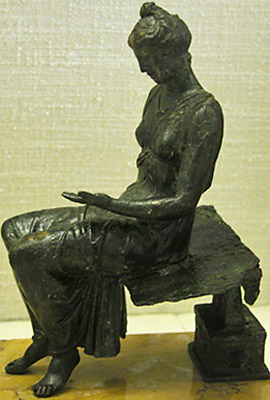
Bronze copy of Hellenistic original

Attusia Lucana Sabina was born into an old Gallic family native to Burdigala (Bordeaux, France), a prosperous commercial city and the capital of the Roman province of Aquitania. Her mother, whose name is not preserved, may have died at an early age, as there is no lament for her in Ausonius' Parentalia, poems honoring deceased family, where Sabina's two sisters appear: Namia Pudentila and Attusia Lucana Talisia. Attusius Lucanus Talisius, Sabina's father, is described by Ausonius as a landowner who shunned public office though his forebears were senators (Parentalia 8 [10]). Not long after choosing his daughter's husband, Decimus Magnus Ausonius (c. 310-393 CE), her father died. Born into a noble provincial family, Sabina no doubt received an elementary education in reading and writing as well as the traditional training for matronal responsibilities. Her age at marriage is unrecorded, but she lived to bear three children before she died at 27 years of age (sometime before 350 CE). Her first son, Ausonius, died in infancy (Parentalia 10 [12]). Her second son, Decimus Hilarianus Hesperius, held political office, married and had three children, one of whom died young (Parentalia 11 [13]). Sabina's third child, a daughter whose name has not been preserved, married Valerius Latinus Euromius, who died after she bore him a child (Parentalia 14 [16]); she remarried, bearing Thalassius two sons. Ausonius survived his only wife as a widower (caelebs) for almost 40 years (Parentalia 8.17 [10]). Sabina is the subject of five poems in Ausonius' Epigrammata (see Epigrammata 20, an 8-line love poem to his wife modeled on Catullus' Carmina 5). The four poems below are 4-line epigrams in elegiac meter, in the style of Martial. Written no doubt while she still lived, each of them celebrates aspects of Sabina's learning.
In this epigram Sabina, referred to here only as coniunx, is credited not only with the ability to read Ausonius' love poetry but with the sophistication to appreciate the wit and conventions of elegy.
Laidas et Glyceras, lascivae nomina famae,
coniunx in nostro carmine cum legeret,
Sabina's skill at weaving is celebrated here; Ausonius equates her work, with the added virtue of its thrift, to the opulent fabrics of the mideast.
Laudet Achaemenias orientis gloria telas,
molle aurum pallis, Graecia, texe tuis,
Sabina is praised by name and as domina in this epigram for her skill in both weaving and decorative stitching.
Sive probas Tyrio textam subtemine vestem,
seu placet inscripti commoditas tituli,
Unique in Ausonius' corpus, this epigram is written in Sabina's voice and is considered by some to have been written by her. In it she cleverly interweaves her skills at verse composition with her needlework.
Licia qui texunt et carmina, carmina Musis,
licia contribuunt, casta Minerva, tibi.
Ast ego rem sociam non dissociabo Sabina,
Click on the underlined words for translation aids and commentary, which will appear in a small window. Click on the icon link
![]() to the right of the
poem for related images and information.
to the right of the
poem for related images and information.